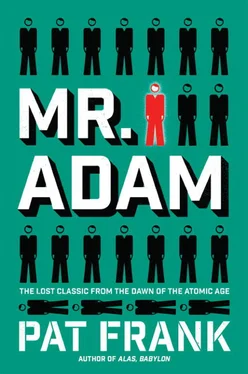“Of course, Homer,” I soothed him, “but just let me know what’s going on. If you start wandering off, and I don’t know where you are, people might not understand. First thing you know you’ll find yourself being tailed by the FBI and the Secret Service and Army G-2, and maybe Abel Pumphrey himself—it would frighten him so.”
“We were followed,” said The Frame. “I’m sure of it.”
“Honest?”
“Absolutely,” said Homer.
“By who?”
“I don’t know. Kathy noticed him first. I never got a good look at him. But he’s somewhere in the building now.”
“Don’t worry,” I said. “I’ll find out about it. So long as you don’t get in a jam, what the hell? People can’t object to you taking an interest in some old stones or mummy cases.”
Jane Zitter looked worried. “That might depend,” she observed, “as to who’s acting as guide.” I noticed that Jane and The Frame were eyeing each other like a pair of strange tabbies, and remembered the introductions. Then I asked, casually:
“And how is archeology today?”
“We were just discussing the legend of Tezcatlipoca,” The Frame remarked coolly. “Although one cannot really call it a legend, since it has been so well authenticated.”
“It must be fascinating.”
“It is for poor Homer,” said The Frame, “because he can see himself in it.”
Homer’s lips smiled, but his eyes were sad as a spaniel’s. “That is quite true,” he said, and explained.
It seems that one of the most bizarre Aztec rites was in honor of the god Tezcatlipoca, the god of fertility and creation. He was depicted as a young man, and handsome. Once each year the Aztecs picked a young man to represent the god. For a year he lived in splendor, and led the most exotic kind of life. His clothes were the finest, he was sprinkled daily with perfume, and flowers were thrown in his path when he went abroad. He was attended by the royal pages, and the people prostrated themselves when they saw him.
Four beautiful girls, each bearing the name of a goddess—or more if he wanted them—were his.
Things went along like this for a year, but at the end of a year they took him to the top of their highest pyramid, and stretched him naked on a sacrificial stone of jasper. “Just like this one,” Homer said.
Then a red-robed priest zipped open his chest and cut out his heart with a volcanic stone knife, holding it aloft towards the sun. The corpse was thrown to the foot of the pyramid. “And then,” Homer continued, shuddering, “they ate him!”
“I would not worry too much about that last part,” I told him. “They might find some soup bones on you, but I don’t see any steaks.”
The Frame leaned against Homer. “I think he is perfectly fine as he is,” she said. “You are just trying to fatten him up so you can use him for your own purposes—all of you.”
“Miss Riddell,” I asked, “are you against A.I.?”
“Theoretically, no,” replied The Frame. “I suppose the human race must be perpetuated, although sometimes”—she glanced at Jane Zitter—“I don’t see why. But I don’t think we are going about it properly, nor do I believe proper consideration is given to Homer’s feelings.”
“I know things aren’t perfect,” I admitted. “Naturally Homer suffers some inconvenience. But can you think of a better way than A.I. to accomplish our purpose?”
“I certainly can!” The Frame said defiantly.
I said we’d talk it over again sometime, and I told Homer I’d see him at dinner, and Jane and I left them to whatever it was they found in the South American annex.
That afternoon Jane persuaded me to go to my office while she initialed memos. It was quite an office I had, as a Special Assistant to the Director of N.R.P., and I was surprised to find that in the really few hours I had been in Washington it was already filling up with letters and telegrams. While Jane did her paperwork, I read a few of them.
There was a letter from Senator Frogham. He congratulated me on my appointment, and hoped he could be of service when a bill for continuing N.R.P. came to the Senate floor—a gentle hint that N.R.P. could not continue forever by presidential order alone.
He went on to say that many of his constituents had written concerning the possibility of bearing an Adam child, and he felt the needs of his state should be considered when the question of first priorities arose.
There was a long, carefully composed, registered letter from the president of the National Insurance Council. He started by saying that the country was on disaster’s brink. People were not buying new insurance policies, because as things presently stood, the future of their progeny was uncertain. If this kept up, thousands of salesmen would be thrown out of work, the companies themselves might collapse, there would be inflation, depression, and the insurance business generally would go to hell. In that case, the country was doomed.
The answer, he said, obviously was to take the sound view that Adam’s children be allotted to people willing to insure the future of those children—the holders of insurance policies. Furthermore, any family which applied for the seed of Adam should be forced to take out policies on whatever children Adam’s seed produced. Thus could disaster be averted.
There was a telegram from the U.S. Chamber of Commerce, urging that an optimistic note be given to official releases on the health and well-being of Mr. Adam. Whenever rumors spread that Mr. Adam was ill, or that there was friction within N.R.P., or that Mr. Adam had been found unsuitable for A.I.—and naturally such rumors kept cropping up—securities collapsed. The Chamber of Commerce felt that above all, everybody should be optimistic.
Both the C.I.O. and the A.F. of L. sent notes that they were confident the rights of feminine union members would be protected when the time came for A.I. to commence. Otherwise, there would be very real and concrete danger of a wholly capitalistic world.
There was a letter from a Hellenic society pointing out that Greece’s population had been greatly reduced by war casualties, outlining Greece’s long record of service to mankind, and requesting priority for Greece when the rights of small nations came under consideration. There was the same type of request from the Poles, the Moslem League, the Armenians, and the Daughters of the American Revolution.
It appeared that there was hardly a group of any kind in all the world—and certainly none which maintained offices in Washington—which couldn’t present a good argument for special attention from the N.R.P. I realized I had become a target, albeit a moving target, for lobbyists and pressure groups. The announcement of my appointment automatically set me up as a clay pigeon. The question of allotting the seed of Adam was one I decided to duck.
Jane Zitter, who had been bulldozing her way through pink, green, and red piles of paper on her desk, suddenly lifted her head and said, “She’s up to something. I can’t figure it out.”
“Who?”
“That girl—The Frame. She’s clever.”
“Sure she’s clever,” I admitted. “But it’s perfectly obvious what she wants. She wants Homer Adam. But then, so does everybody else, and most of them are pretty damn selfish. You can tell by reading my mail. You’ve got to hand it to The Frame. She goes out to get him, personally. She doesn’t write letters explaining why she, and no other woman, is entitled to first crack at Homer. She has drive, and initiative.”
Jane shook her head. “No, I think you’re wrong. I suspect her of everything. She might even be a Communist agent. Hollywood is full of Communists, isn’t it?”
“I don’t know,” I said. “I always thought Washington was full of Commies. For all I know you might be a Communist.”
Читать дальше












